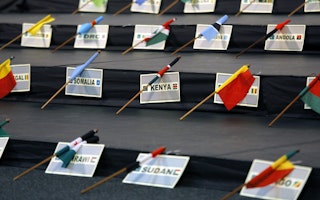The Power of Civil Society in the Arab Region
By Chris Stone

In the central square of Tunis, there is a makeshift monument to the uprising that propelled democracy across this country and then across North Africa. On one side, in Arabic, the canvas skin of the monument is imprinted with the word Revolution. On the other side, Freedom. In between appear two dates: 17 December 2010 and 14 January 2011, the beginning and end of an uprising that sent Tunisia’s dictator packing.
It seems longer ago than that. Today, across from the monument, the Ministry of the Interior is surrounded with barbed wire, barricades, and tanks to protect it from demonstrators in the square. Activists in the women’s movement here insist to me that their movement today seeks simply to defend and retain the rights women had secured as long ago as the progressive personal status law of 1956. Despite a strike by journalists on behalf of press freedom, the independent media body promised in law exists only on paper. Unemployment is at crisis levels and rising. There is not yet a constitution and a state of emergency remains in force.
Life has changed in Tunisia—the new freedom is palpable in the streets where protests still spring up and in heated debates in public meetings where activists confront officials—but for all the freedom, the revolution has slowed to a crawl and seems some days to be running in reverse. Why? There is no one answer, but part of it is the weak organization of the revolutionaries and their followers. Mass demonstrations, spontaneous protests, and a series of leaderless uprisings in this region were able to force dictators from power, but in the aftermath they have not yet been able to take up power and forge a better society. Instead, power has gone to those who were organized, whether or not they made the revolutions.
You would think, in such circumstances, that the champions of freedom, democracy, and revolution would be searching for stronger forms of organization. Instead, there is a debate about the desirability of organization at all, a fascination with leaderless, informal, groups: the organizationally amorphous. This week, I encountered the same debate in Tunis, and as I listened in a chilly room full of activists to a young blogger engaged in the issue, I gained renewed hope for this revolution.
The blogger whose account I share here is Amira Yahyaoui, a 27-year-old activist who has been an advocate for freedom of expression for more than a decade. As a teenager, she was beaten by the secret police for her activism and was eventually banned from her country, living in exile for four years. When she returned to Tunis after the revolution, she continued her online advocacy for free speech and threw herself into the new political life of the country.
Six months ago, she formed an NGO, sought funding from the Open Society Foundations, and built an organization, Al Bawsala, with a paid staff that is simultaneously professional and activist. Today, Amira and Al Bawsala are forces in Tunisian politics, monitoring the work of members of the national Constituent Assembly (recently they photographed a member voting on the same bill three times—a scandal that captured the attention of the nation), publishing the assembly’s documents and debates, and equipping their young audience to get involved. She knows the arguments against taking funding from anyone, of remaining a volunteer movement, steering clear of a paid professionalism that can deaden activism. But she disagrees.
It was important to me, she explains, to create an NGO and to pay salaries. It is about power. You have to pay salaries and have a real staff to have power. Volunteers can do lots of things. Volunteers can topple a dictator, but volunteers cannot replace him. Without good NGOs with paid staff, civil society cannot maintain its power.
I like to think that the Open Society Foundations would have found a way to support Amira, whatever side of this debate she had taken. We support individuals (including volunteer activists) through our scholarships and fellowships, loose social movements through grants to fiscal sponsors, and NGOs like Al Bawsala with direct grants to organizations. But, personally, I am glad that she has chosen to build an organization. We create organizations, small and large, because they allow us to achieve things we cannot otherwise accomplish. As Amira says, it is about power: power that can achieve and sustain change. Nowhere today is real achievement more important than in the democratic project of the Arab region.
The cynicism about large, professional NGOs is understandable. At times, in low-income countries the salaries paid by some elite NGOs can seem corrupting and their 4-by-4s crude symbols of privilege. Across Africa, NGOs do not score well in surveys measuring public trust and confidence. But the insensitivity and arrogance of some should not distract us from building the robust, durable organizations necessary to consolidate the power of a revolutionary movement and prove the equal of competing forms of organized power.
A makeshift monument in a public square can serve as an important reminder of courageous struggles and sacrifice, but organizations like Al Bawsala may prove to be the more powerful monuments to revolution.
Until December 2017, Chris Stone was president of the Open Society Foundations.


